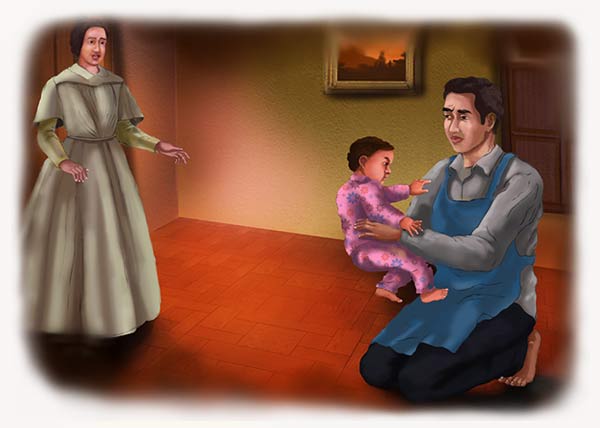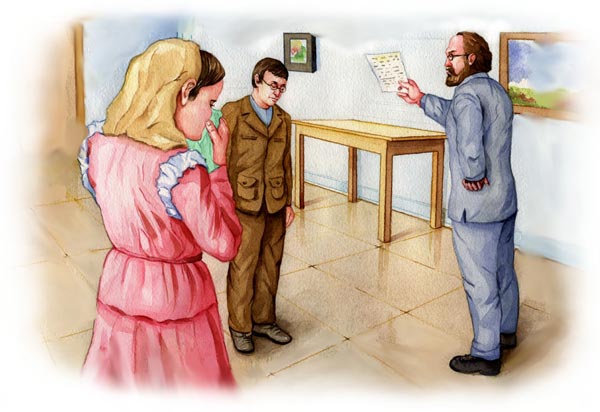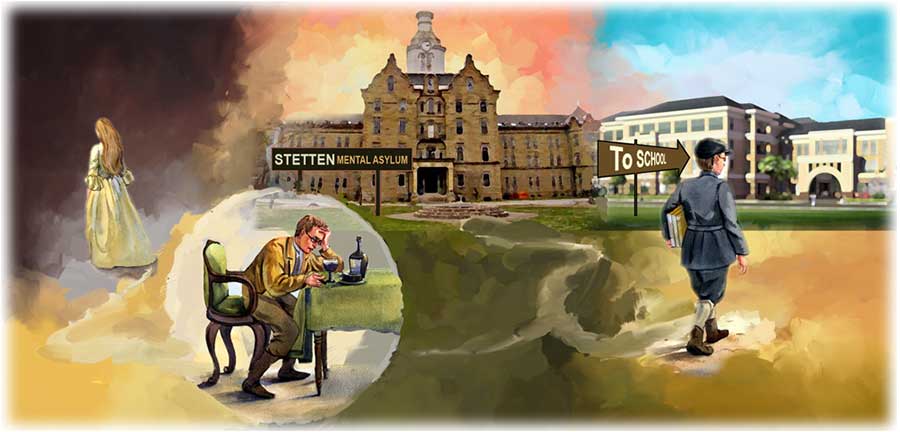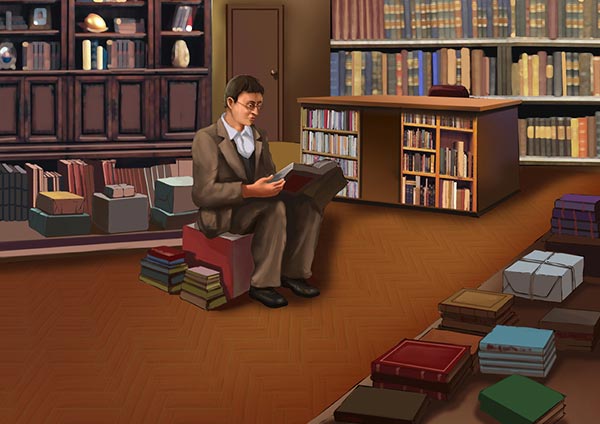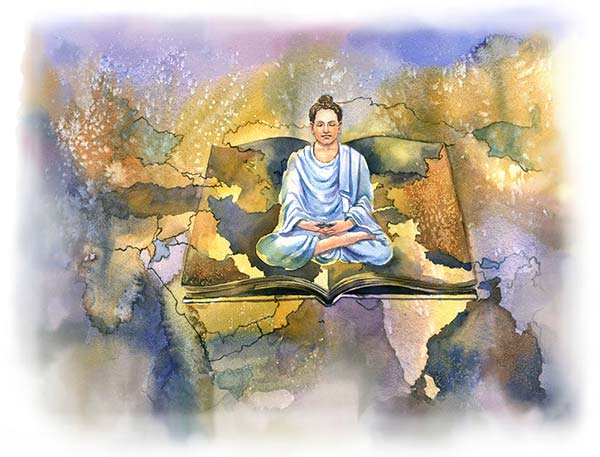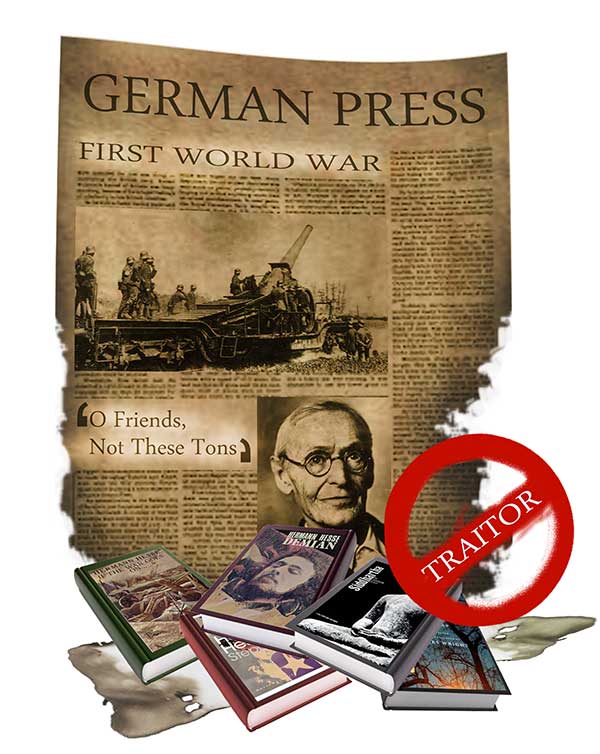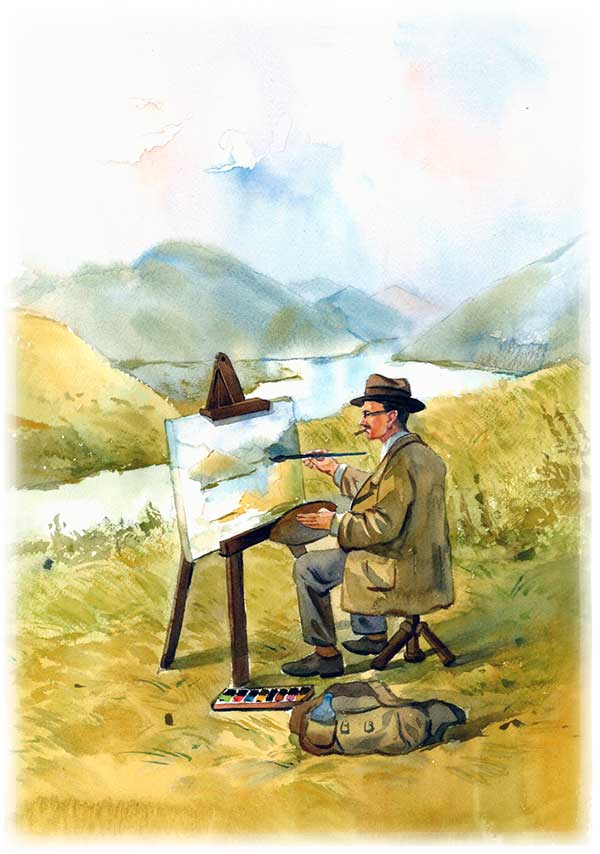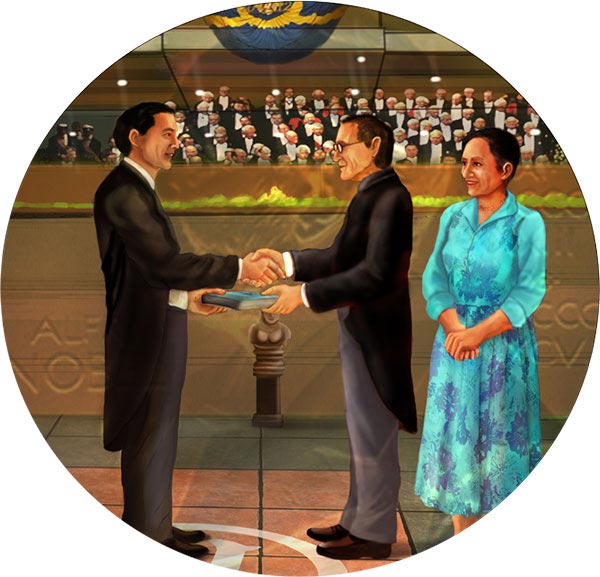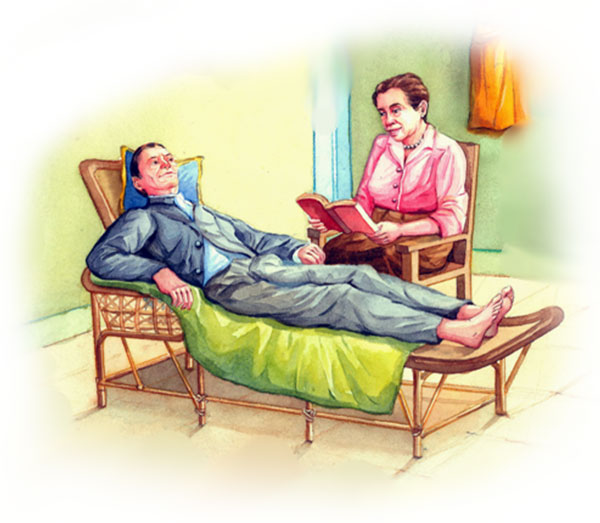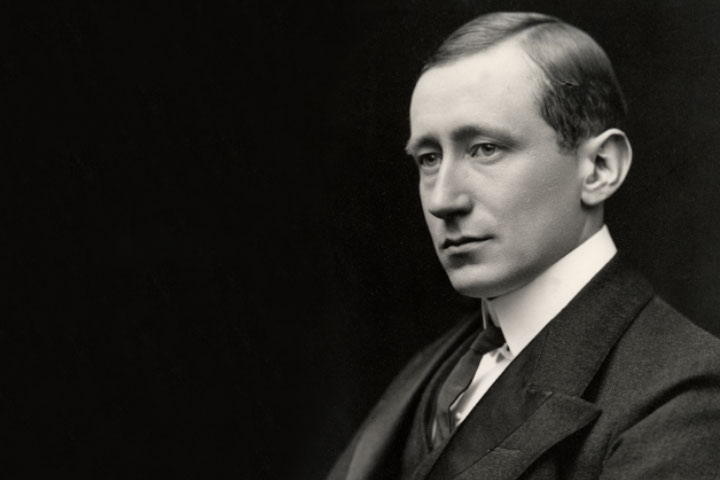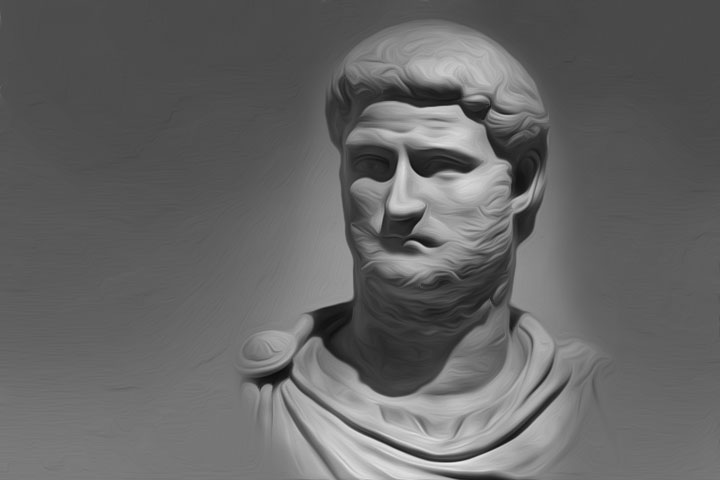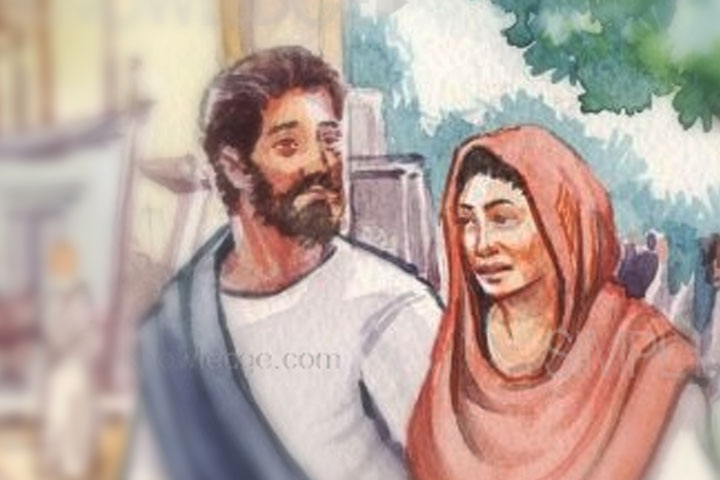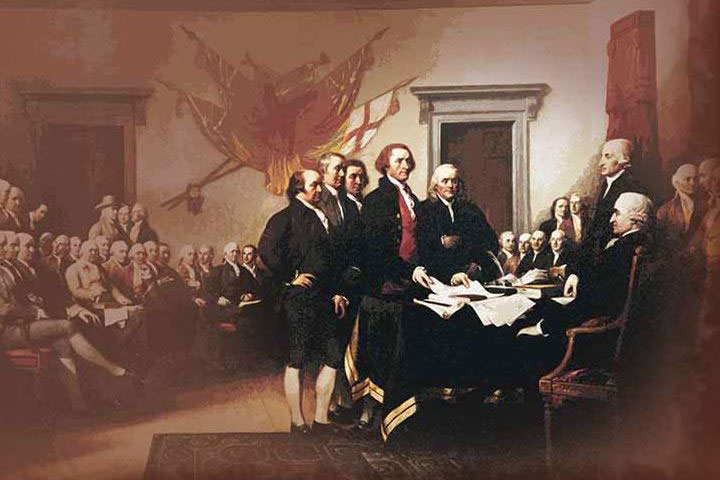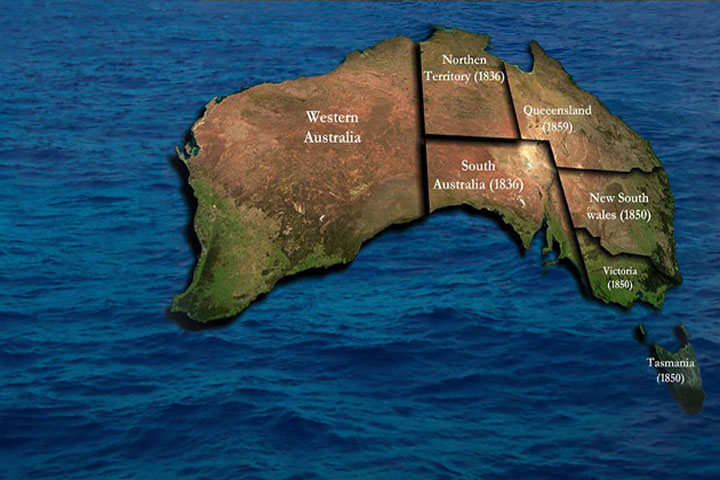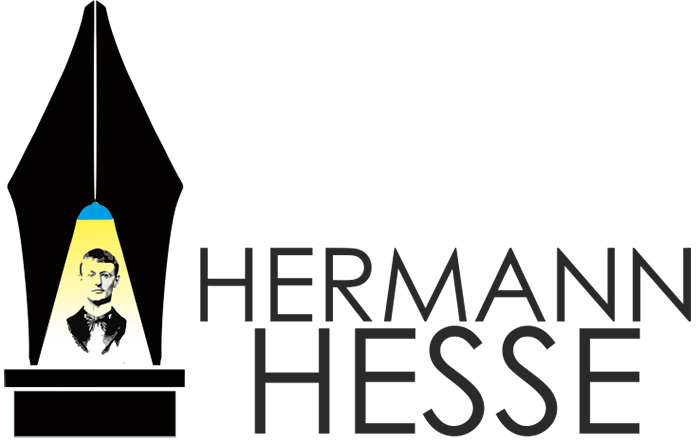
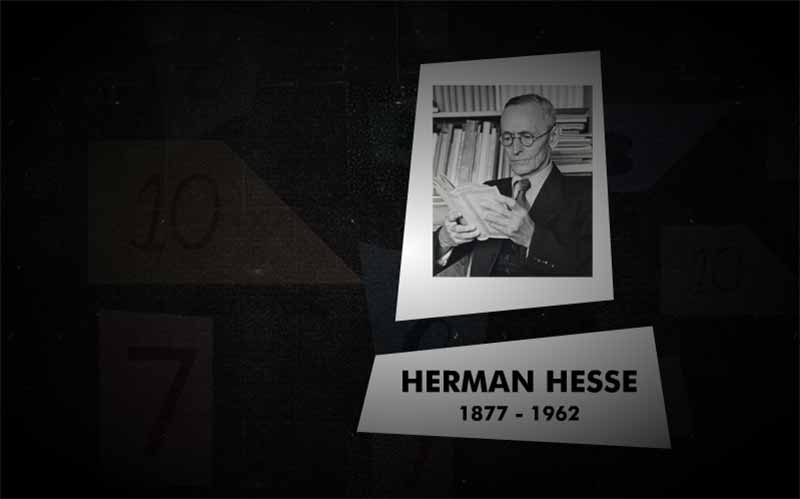
Introduction
“Knowledge can be communicated, but wisdom cannot. A man can find it, he can live it, be fortified by it, do wonders through it, but he cannot utter or teach it.”
This remarkable quote created a flutter in the field of literature and many renowned scholars and philosophers were impressed by it.Only an astonishing mind and a passionate reader of literature can deliver such an acute view on wisdom. What’s more, his best work compiles of Steppenwolf, Siddharta, and The Glass Bead Games ,each of which describes an individual’s search for spirituality and lays emphasis on self development. The winner of Nobel Prize in Literature in the year 1946, let me introduce you readers to HERMANN HESSE, a German poet, novelist and painter.

Birth And Family History
Marie Gundert and Johannes Hesse were proud to announce the birth of their son Hermann Hesse on 2 July, 1877, in the Black forest town of Calw in Wurttemberg, Germany. Hermann’s parents served in India at a Basel Mission, established under a Protestant Christian Missionary Society. Hermann’s mother, Marie Gundert was born in India at such a mission and was herself a brilliant poetess and avid reader of literature and master of five languages. She was earlier married to Charles Isenberg, a British national, and bore two sons - Theodor and Karl, both born in India. However, after a brief period, Charles passed away due to serious ailment and Marie subsequently married Johannes Hermann. Her father, Hermann Gundert, although tyrannical in nature, was a doctor of Philosophy and fluent in English, German, French and Italian languages. Johannes Hesse was the son of Dr. Carl Hermann Hesse, a successful medical practitioner who too was as tyrannical as Dr. Hermann Gundert.
Johannes Hesse belonged to the German minority in the Baltic region which was under the Russian Empire. As a result, his son, Hermann Hesse had the privilege to be granted citizenship of the German Empire and the Russian Empire. Johannes Hesse worked for a reputed publishing house called ‘The Calwer Verlagsverein’ which specialized in theological scripts and schoolbooks and was managed by his father-in- law, Dr. Hermann Gundert.
Hermann Hesse was Johannes and Marie’s second child. They were earlier blessed with a daughter, Adele, in the year 1875, followed by Hermann in the year 1877. Hermann had four other siblings- Paul, Gertrud, Marulla and Johannes. Of these, Paul and Gertrud died in their infancy. Thus, Hermann Hesse belonged to a large big family of brothers and sisters and Marie brought them up with intermittent help from her husband.

Childhood and Education
Maria was ecstatic that her bundle of joy was a healthy, chubby fellow as she mentioned in one of her notes- “Is a very big, heavy beautiful child who is hungry right off the bat… and turns his head towards the light all by himself”. By the time Hermann turned nineteen months old, he started showing the first signs of an aggressive nature when he twisted the arms of one of the housekeeper in order to free himself from his grip. Thus, right from the beginning, Hermann showed complex personality and his family found it too difficult to manage his boisterous and stubborn nature. He too inherited the characteristics of being tyrannical and rebellious. However, he possessed a powerful mind.
Hermann felt the strain in his childhood when he craved for closeness and warmth of his parents. Being born in a large family, his parents were overburdened and each one bore these burdens in different ways. A peculiar dream always haunted Hermann in his childhood days. He would see a clear blue sky on the top of the mountains and brown dusters of village and towns. There were boulders and ruins across an imaginary wall. He would first cling to his mother’s coat and then would clutch his father’s hand. All of a sudden, he imagined as if somebody wais holding him tightly under his armpits and trying to swing him high on the imaginary wall. He could also hear voices of tourists and the laughter of children. All he could sense was the depth below and a weird emptiness around him. He used to wake up trembling and shivering at nights until his mother comforted him warmly and tuck him safely to bed.

This was just the beginning of a tumultuous life- with a fear of losing contact with his parents or being expelled for minor sins and imprudence. He craved for his father’s attention and would wait endlessly for his mother’s goodnight kiss. The feeling of insecurity was actually playing havoc in his mind.
When Hermann was four years old, the family temporarily shifted to Basel in Switzerland where they lived for six years. It was a large spacious house with a beautiful garden and the children had much freedom to enjoy themselves. Initially, Hermann too enjoyed the life in Basel. Chasing butterflies gave him maximum enjoyment and so watching trains running up and down close by their home. But soon his pretty world changed into darkness. His violent temper tantrums became a habit. His father would often punish him be it for a simple lie or for stealing an apple or for his tantrums. Each time he was reprimanded by his father, Hermann would run to his mother begging for forgiveness or to his elder sister Adele for comfort.
After a few months, he was enrolled at the Mission Nursery school where his attitude showed improvement, though temporary. He became close to the principal, Parson Pfisterer who understood Hermann’s problematic attitude and became his mentor. The family spent a quiet vacation in the mountains of the Swiss Jura and Marie noticed that Hermann was happy and mentally healthy.
Hermann’s behavioural attitude was pathetic as his rebellious nature forced his parents to change schools one after the other. After receiving a series of complaints about their son’s precocious nature from the teaching faculties, his parents realized that their son was not an ordinary child. At one point, they even thought of sending Hermann away to a foster home as it was getting too difficult and humiliating for them to bring him up. However, they soon discovered that Hermann was gifted with classic observation power, an intelligent mind capable of memorizing a number of poetries as compared to other children of his age and was proficient in making amazing paintings and improvising on the harmonium.

In one of her diaries, Marie noted “The little fellow has a life in him, an unbelievable powerful will, and for his four years of age, a truly astonishing mind. How can he express all that? It truly gnaws at my life, his tyrannical temperament, his turbulent nature… God must shape this proud spirit, then it will become noble and magnificent- Oh! I shudder to think what this young and passionate person might become should his upbringing be false or weak.”
The family eventually shifted back to Calw where Hermann attended his first school ‘The Latin School’ in Goppingen. His attitude too became manageable and he always impressed his parents by scoring at the top of his class. After completing his primary education, his parents enrolled him in the ‘Evangelical Theological Seminary of Maulbronn Abbey’ which was considered as Germany’s most beautiful and magnificent abbey. It was similar to a boarding school where students lived and studied for 41 hours of classes a week. Hermann was very happy to be a part of the most prestigious boarding school of Germany as it was this school which gave birth to the most enriching thoughts that created a magic in the literary world. The atmosphere at the seminary appealed to him and he was content with the open relationship with other pupils and established a good rapport with his teachers. Hermann performed quite well academically in the first few months and excelled in writing essays and translating Greek poetry into German.
Hermann’s upbringing was in a Swabian Pietist household where the family members motivated believers into small thoughtful groups. The Baltic German heritage played an important role in nurturing Hermann’s mind. The atmosphere and the adventures by the riverside, the days spent in fishing from St. Nicholas Bridge, the ringing bells in the chapel, the houses leaning closely together, the nooks and corners of the crannies at Calw and the inhabitants with their beautiful culture, captivated Hermann’s mind forever.
“For mountains and stream, trees and reafs, roots and blossom, every form in natures echoed in us and originates in the soul whose being is eternity and is hidden from us but nontheless gives itself to us for the most part in the power of love.”
However, this happy phase did not last very long as it also marked the beginning of personal crisis which made Hermann’s life miserable. His rebellious attitude disrupted his path to development as a storm ravaged his mind and he was widely misunderstood. Hermann’s first encounter with mental illness was at the age of twelve when his father Johanness Hesse suffered a severe depression and collapsed, the reason being the pressure and tension of work, which was too much for him to handle. They were all staying together at Dr.Gundert’s house which partly accommodated his office as well. Lack of space and Dr. Gundert’s authoritarian attitude created more tensions. For two months he was treated in a hospital, and Marie ,along with Adele surveyed for a new home. Hermann was very disturbed with his father’s illness and his incapability to do something needful made matters worse.
Another important incident that left a deep impact on Hermann’s mind was Theodor’s escape to Munich to become a music director. However, a compromise was reached and Theodor decided to complete his exams before devoting himself fully to music. Music and poetry played a major role in Hermann’s life. His mother wrote poetries and his father was brilliant at linguistic control, both in sermons and writing of religious tracts. About music he once quoted:-
“I am fond of music and i think it is so a moral. Everything else is moral and i am something that isn’t. I have always found moralizing intolerable”.
After his father’s discharge from the hospital, things moved on smoothly. However, the cycle of punishment, aggression, forgiveness and tears was still a part of Hermann’s daily life. He fled from the seminary and spent a whole day in the fields just wandering about. This led to punishments, solitary confinements and eventually rustication from the seminary.
He started suffering from headaches and insomnia which made matters worse. All this did not go down too well with his parents and led to major confrontations and conflicts. They realized that their son desperately needed psychiatric treatment. Then began a series of journey through various schools and institutions. Finally, Hermann was enrolled at an institution at Bad Boll under the auspices of theologian and Minister Cristoph Friedrich Blumhardt who was a colleague of Hermann’s grandfather, and so it was expected that the child would receive special treatment.

Period of Crisis
Life at Bad Boll was not that bad for Hermann as he enjoyed playing billiards and checkers to the sound of Beethoven orchestra. He was given ample freedom and received permission to spend time with his half- brother Theodor, who was staying on rent at Cannsttat. Hermann met Eugenie Kolb, Theo’s landlady’s daughter and fell in love with her. She was twenty-two and Hermann was only seventeen. When Hermann declared his love for her, she gently refused. This drove him to despair and Hermann attempted suicide. Blumhardt was very annoyed and summoned his mother Marie. He demanded that the boy should be confined to a mental asylum at once and also blasted Marie for her shoddy upbringing. Finally, after much debate and suggestions from other physicians, Hermann was admitted at Stetten, an institution for mentally retarded and epileptic children. Hermann was deeply hurt by the rejection showed by his parents and shouted “Do you want to lock me up in a prison? I’d rather jump into that well over there”.
Soon, after a series of serious counseling, Hermann agreed to stay. Hermann adapted himself well in the institution. Under the guidance and supervision of the director- Parson Gottlieb Schalls, Hermann learnt gardening and enjoyed every bit of it. He even began tutoring other inmates of the institution and pursued his interest in Latin and other studies. He also wrote a volume of poems for Eugenie Kolb and hoped she would reciprocate her feelings for him. This time, Eugenie was careful and reverted:
“I beg you Hermann, please forget the past and take care of your health. Remember and believe me, when I say to you, the first love is never, never the right one.” She concluded that she would gladly be his friend forever.”
After a few months, Hermann showed positive attitude and was released on account of good behaviour. Hermann resumed his studies at a secondary school in Cannstatt, near Stuttgart. However, he began missing Eugiene Kolb and the cycle of depression continued. Hermann began to smoke heavily. Despite of the turbulent phase, he passed the One year examination which concluded his schooling and his family finally granted him permission to return home to Calw.
It is difficult to ascertain the facts that made Hermann such a complex person, whether his outcaste from the family made him rebellious or was he actually ill- the madness or moral insanity? On insanity, Hermann’s thoughts were different. According to him, “When dealing with the insane, the best method is to pretend to be insane.”
Hermann’s life as a boy was torn between doubts of his father’s religion, a sense of his father’s failure, rejection from his first love and the love of other two women-his mother and sister. For some time, Hermann assisted his father in the publishing house. His grandfather, Dr Gundert encouraged Hermann to read widely and gave access to his vast library which was filled with books pertaining to world literature. It was under his grandfather’s guidance that Hermann developed wings to explore the world of literature.

A Writer is Born
The turbulent phase in Hermann’s life had now made him more matured and responsible. The cycle of discontentment seemed to subside and he started working as an apprentice in a bookshop in Esslingen am Neckar. Although he quit after three days he had already made a firm decision of becoming a poet. He once quoted:
“From the 13th year on, it was clear to me that I wanted to be a poet or nothing at all”.
Hermann now began working as a mechanical apprentice at a clock tower factory in Calw. The monotonous work of soldering and filing led Hermann to seek spiritual answers. He worked hard there for few months as he resolved to be financially independent, but ultimately, joined as an apprentice in a bookshop in Tubingen. This was the turning point in Hermann’s life as his literary career was about to begin. The bookshop comprised books related to Theology, Philosophy and Law which were Hermann’s favourite subjects. Hermann’s job responsibilities included organizing, packing and archiving the books, which he enjoyed thoroughly. Such was his passion for books that even after dedicating twelve hours to work daily, he pursued his love for reading.
Even on Sundays, instead of loitering around with his friends he chose to read books and would devote much time in research of theological writings, Goethe, Lessing, Schiller and numerous texts on Greek mythology.
“Without words, without writing and without books there would be no history, there could be no concept of humanity.”
By the time he attained 18 years of age, Hermann became financially independent. He decided to expand his horizon of reading, not merely confining himself to Theology and Philosophy, but also absorbing the work and writings of German Romantics. He was quite impressed with writings by Clemens Brentano, Joseph Freiherr Von Eichendorff, Friedrich Holderlin and Novalis who were all renowned poets and novelists. Inspired by these authors, Hermann penned his first poem, ‘Madonna’ which was published in Viennese periodicals. Around the same year in 1897, he released his first collection of poetries called ‘Romantic Songs’. Though it did not prove to be too successful, but one of his poems from the collection called ‘Grand Valse’ drew him a fan mail from a lady- Helene Voigt. This encouraged Hermann further and in the subsequent year he released another collection of poems called ‘One Hour after Midnight.’ It was Helene Voigt’s husband, Mr. Eugen Diederichs, a young publisher, who in his zeal to please his wife, agreed to publish Hermann’s poems. But both the collections were unsuccessful as it failed to impress the readers. Only 54 copies out of 600 printed versions of ‘Romantic Songs’ were sold and ‘One Hour after Midnight’ sales was a huge disaster. Hermann’s mother too did not approve of ‘Romantic Songs’ as she found them to be quite bold and sinful. Hermann did not expect such resentment from his mother and was rather shocked.
Around 1899, Hermann began working for an antique book store in Basel. He decided to stay away from his parents and through family contacts began staying at various spiritually inclined families. The whole year was spent in solitude, aloof from the social glare leading him to live life in a shell. Thus began a journey of self- realization and spirituality.
The initial period of the 19th century was marked by large political unrest throughout the world. Germany had made compulsory for its citizens to attain military training. However, during a routine medical checkup, Hermann was diagnosed with an eye ailment resulting in frequent headaches and hence, was exempted from military services. Hermann made best use of the opportunity and decided to travel to Italy as it was his long cherished dream to travel abroad. In Italy too, he spent much of his time in book stores and writing poems. After his return to Germany, he began to work at the Antiquarium book store in Wattenwyl, Basel. He began writing extensively and released poems and journals for which he received honorariums. He also received adequate support from the owner of the bookstore who released his next set of poems, ‘Posthumous Writings and Poems of Hermann- Lauscher’. In the same year, Hermann received a jolt when his mother expired after a prolonged illness. Hermann was so shaken by the tragedy that he did not have the courage to attend her funeral as he feared that he may again go into depression.
Lauscher was a huge success and the publisher, Samuel Fischer, realized that Hermann did possess tremendous potential in writing poems. Samuel encouraged Hermann to write novels and thus Hermann’s first novel ‘Peter Camenzind’ was released in the year 1904. It was a huge success and Hermann was not only recognized as an accomplished writer in the literary circle but he also became financially strong. The novel gained widespread popularity and Sigmund Freud, an Australian Neurologist and the founder father of Psychoanalysis, appreciated ‘Peter Camenzind’ as one of his favourite novels.

Hermann’s Domestic life
With literary fame enveloping him, Hermann’s reputation soared and his financial position escalated. He eventually decided to settle down. Fortunately, on one of his trip to Italy, he met Maria Bernoulli who belonged to a reputed family of scholars in Mathematics. They finally tied the knot in April 1903 and began their marital life in the village of Gaienhofen on Lake Constance. It was a simple life with reasonable amenities as both Maria and Hermann wanted to lead a natural and simple country life. The royalties received from ‘Peter Camenzind’ enabled Hermann to give up his job and become a full time writer. Hermann was very satisfied with the achievement and felt as if he had won a long and grueling battle with the world.
In August 1904, Hermann and Maria started staying in their farmhouse in Gaienhofen on Lake Constance. Hermann’s popularity increased manifold during the Gaienhofen years.

Hermann’s Golden period
Hermann’s literary career was at its peak as his circle of fellow writers increased. He developed new acquaintances and friends, most of whom were musicians and painters. Music and art always captured Hermann’s mind and he was encouraged to write texts for a couple of operas.
In 1904, he was awarded the Bauernfeld prize and the Swabian Schiller Society unanimously elected him as an associate member and the first Hesse society was created. It was indeed a matter of pride for Hermann and it further motivated him. More happiness came Hermann’s way, when the couple were blessed with their first child, a son named Bruno, in 1905.
Hermann continued with his passion of writing and released his second novel, ‘Beneath the Wheel’ in the year 1906. During the same period, he composed a number of short stories and poems and one of his story ‘Wolf’ was considered as a shadow of ‘Steppenwolf’.
Few years passed and Hermann’s family had a new addition following the birth of his second son, Heiner in 1909. Around the year 1910, he wrote his third novel, ‘Gertrude’ and although it was a success, Hermann had to struggle to release it due to complications in production. Hermann described the publication of ‘Gertrude’ as a ‘miscarriage’.
Around 1911, Hermann was blessed with his third child, Martin. It was in Gaienhofen that Hermann began taking keen interest in Buddhisim and befriended another famous novelist, Arthur Schopenhauer. Both of them made combined efforts to study Buddhisim and its roots in India.
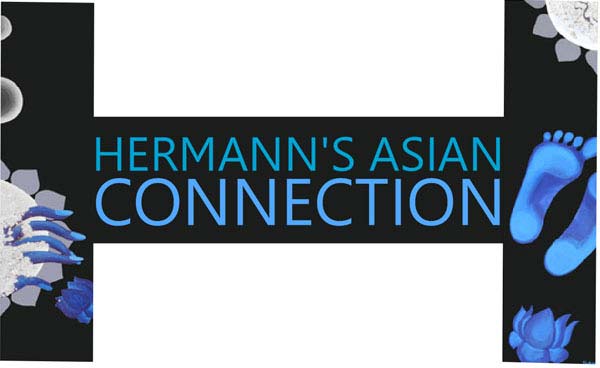
Hermann’s Asian Connection
While Hermann’s professional life was going very well, his personal life however, was passing through rough weather. There used to be frequent fights and frictions between him and his wife, Maria, which led to long distances between the couple. As a result, Hermann chose to travel to India. Hermann had always found himself attached to India as it was not only his mother’s homeland but also as his father and grandfather had spent a lot of time here. He was very enchanted by India and experienced spiritual satisfaction there. After his brief stay in India, he chose to travel to other Asian countries like Sri Lanka, Indonesia, Burma and Sumatra. Though he travelled in pursuit of spiritual satisfaction, he faced depression. However, on the positive side, due to the long journey, he acquired lot of literary knowledge, particularly on Buddhisim, which helped him enhance the quality of his writing.
“Every age, every culture, every custom and tradition has its own character, its own.”
When Hermann returned, the family decided to move to Bern but the relationship between him and Maria soured further. Hermann was mentally very disturbed and although he tried hard to revive his marital life, it met with failure. On his marital life, Hermann quoted:-
“Perhaps people like us cannot love. Ordinary people can – that is their secret.”
Their new house in Bern inspired Hermann to pen his next novel- ‘Rosshalde’ which was a story of the sickness and death of a lovable little boy.

First World War
The First World War began after a series of diplomatic clashes between the Great Powers- Italy, France, Germany, Britain and Russia over European and Colonial issues. It brought in widespread destruction, poverty and hunger, and Germany too suffered massively. Hermann’s patriotic feelings for his country awakened his mind and he volunteered his services to the Imperial army. He said “How can I sit inactively by a warm fireplace, while other young authors were dying on the war front”. However, since he suffered from a nerve disorder pertaining to his eye, he was declared unfit for combat duty and instead was assigned the responsibility of taking care of war soldiers in Consulate of Germany, in Bern, Switzerland. From then on, Hermann worked tirelessly for the welfare of the prisoners of war. He organized demonstrations, edited newspapers meant for German prisoners of war, wrote anti-war articles and published a series of books for prisoners.
The poets, novelist and authors of other countries who were engaged in the war developed hatred for one other which disturbed Hermann immensely, as nationalism overpowered humanity. The situation inspired him to write a novel titled ‘O Friends, Not These Tons’ where he made sincere appeal to writers, authors and poets not to get embroiled in mutual hatred and instead spread humanity, peace and love through their writings. He believed in the doctrine of ‘Pen is mightier than sword’. Hermann wrote:
“That love is greater than hate, understanding greater than ire, peace nobler than war, this exactly is what this unholy war should burn into our memories, more so than ever felt before.”
The quotation created stir across the continent and Hermann was caught in the middle of a serious political controversy. He started receiving hate mails and many of his friends from the literary circle chose to desert him. The German Press called him a ‘traitor’ and all sorts of things which hurt Hermann immensely. To display their anger, people in Germany began burning books and journals written by him on which Hermann quoted:
“Whenever books are burned, sooner or later men are also burnt.”
Only two of Hermann’s close friends- Theodor Heuss and Romain Rolland, both French writers, co-operated with Hermann and stood by him in the critical period.
“Love is stronger than violence.”
The controversy created by Hermann’s book had not yet resolved when he received a severe blow which rocked his personal life and plunged him into a period of profound crisis. Hermann lost his fathe,r and his son Heiner too fell severely sick. To make matters worse, his wife was found suffering with Schizophrenia. The crisis in Hermann’s life was too complicated for him to handle and he succumbed to the mental pressures. He was declared medically unfit to serve the army and thus began a long series of psychoanalysis under the care of Dr. J.B. Lang who was a student of Carl Gustav Jung, the famous Swiss psychologist and psychiatrist. As part of his treatment, Lang motivated Hermann to improvise his creative talents to new heights.
It was around 1917, that Hermann released his novel, ‘Demian’ which was published under the pseudonym Emil Sinclair. ‘Demian’ is one of the most significant books by Hermann as it was a product of psychoanalysis which he underwent. By the time it was published, Hermann had already left his house in Bern vowing never to return again. Hermann’s wife was admitted to a mental institution and although she recovered after severe episode of psychosis, Hermann saw no future with her and ultimately their marriage ended. After formal divorce proceedings, Hermann decided to settle in Ticino, Switzerland. Their children were adopted by distant relations and Hermann announced that he would financially support them in their upbringing.
Ticino is famous for its scenic beauty and is a paradise on earth and Hermann was totally mesmerized by the beautiful landscapes, lakes, valleys, mountains covered with snow and the villages. It inspired Hermann to depict Ticino’s beauty on canvas and thus his interest in painting was invigorated. He had an eye for beauty and portrayed everything mediocre, normal and average. He felt so contented and satisfied by painting that he quoted
“One day, I discovered an entirely new joy. Suddenly at the age of forty, I began to paint.”
Along with his new hobby of painting, he started writing as well. His passion for painting influenced his writing, thereby enriching the quality of his scripts. Hermann termed his stay in Ticino as the “most joyous, fullest and the passionate time of my life.”
After staying in Ticino for a brief period, Hermann rented a small house at Casa Camuzzi where he continued with his passion of writing and released yet another novel “Klingsor’s Last summer.” Klingsor was Hermann’s imagination of magician of art. It expressed the view that the artist must portray his sensuous self. In the story, Hermann makes attempts to paint his dreams by portraying the magician artist as a painter. It displayed Hermann’s own life from the moment he had stepped out on the balcony to view his favourite garden. It was during the writing of ‘Klingsor’s Last Summer’ that he met Ruth Wenger, a young singer and daughter of Swiss writer, Lisa Wenger. Hermann found Ruth Wenger smart, attractive and gave her a nickname ‘Queen of the Mountains.’ She was staying with her parents at Carona and was very fond of pets as her huge mansion at Carona was a home to numerous cats and dogs.

A Spiritual Journey
Hermann had already been on a trip to India before the Great War and the decision to write “Siddhartha” had developed its roots during the trip. Hermann realized that it was time to resume his work on Siddhartha. Writing this book was a totally unusual experience for Hermann as he went into the skin of the protagonist. He began to live a life of recluse, and immersed himself totally in the philosophy of Buddhism and Hinduism. The main aim to write Siddhartha was to ‘cure his sickness with life’. Hermann did not face any hindrance while writing the first part of Siddhartha but found it very grueling to write the second part. He felt comfortable writing from his personal experiences, the spiritual life and the young Brahmin’s thirst for wisdom, but when he had to transcend from the ascetic to the victorious Siddhartha he could not progress. Hermann’s failure to proceed further on the novel led him to depression. It was during this time, he came in contact with Hugo Boll who worked as a Director in the Munich Repertory Playhouse and his live-in partner Emmy Hennings, a singer in a cabaret called Simplizissimus. After the outbreak of war, Emmy was arrested by the German authorities as they suspected her of anti-war activities. But she was soon released and she fled to Switzerland with Hugo Boll where they performed variety shows. It was during these shows they met Hermann, and the various meetings at coffee shops, long chats in the afternoons, and the pleasant evenings spent together culminated in friendship which grew rapidly. It seemed as if their lives revolved around each other and the intensity of their rapport suited them well. Hugo and Emmy brought stability in Hermann’s life and supported him to overcome his depression.
However, Hermann could not continue with Siddhartha. He began to spend time on writing journals, lecturing, painting and other small reviews just enough to earn him his daily bread and butter. After their brief stay in Switzerland, the Bolls returned to Northern Germany but continued their correspondence with Herman through letters and mails.
The year 1920, according to Hermann was “the most unproductive year of my life. I lived like a snake, slowly and economically”. Hugo’s departure from Montagnola made Hermann more anxious and tired. At the same time, his acquaintance with Ruth Wenger grew and Hermann found the much needed sympathy and consolation in her company. He also began to travel extensively to Zurich, Olten and Bern for delivering lectures. His relationship with the Wenger family drew him closer to Ruth.
Hermann received a major breakthrough when his cousin from Japan, Wilhelm Gundert visited him in the year 1922. Wilhelm Gundert was a professor and missionary from Tokyo and possessed abundant knowledge on the life of Gautam Buddha (Siddhartha). With Wilhelm Gundert’s assistance, Hermann resumed his writing on Siddhartha. His lectures and sermons on Buddha impressed Hermann and he confessed to Hugo in one of his letters
“I am stuck in ancient India and have realized what is Bhraman and Aatman, along with Buddha.”
It took Hermann three years to write Siddhartha. “Buddha’s way to salvation is not just an intellectual perception but also the spiritual experience that can be earned through strict discipline in a selfless life”. This was the message of “Siddhartha”. The book finally earned Hermann his success and recognition. After the release of Siddhartha, Hermann quoted “the novel is the product of 20 years of familiarity with Indian and Chinese Culture.”
Siddhartha had at last become a sort of achievement for Hermann but the project drained the energy out of him. He was plagued by acute pain in his eyes and legs that drove him to agony and despair. No amount of physiotherapy was helping him and a sense of poverty prevailed, as obligation towards his children took away much part of his earnings. He realized that he had to continue writing in order to attain financial stability. During the same time, Hugo and Emmy Boll returned to Switzerland and Hermann was overjoyed on seeing them.
In the year 1923, the foundation for three important novels was laid: ‘A Guest at the Spa’, ‘Journey to Nuremberg’ and ‘Steppenwolf’. ‘A Guest at the Spa’ was written during the year 1923 and described the torture of illness seriously, humorously and playfully. It was during the writing of this novel that Hermann decided to tie the knot with Ruth Wenger. The very same year Hermann was granted Swiss citizenship and by the end of the year he was making final arrangements for his wedding. But just a few days before his wedding, he again became depressed and came down with high fever. Hermann was in his forties, burdened with family obligations and Ruth was a young, vivacious girl in her twenties. He was worried for his children, particularly Heiner and Martin. However after much dilemna, Hermann and Ruth got married on January 11, 1924. However, within the first few years of marriage itself, cracks developed in their relationship. Hermann disclosed to his friend Hugo Boll about it:-
“Being married, which I’m now supposed to learn again, does not turn out too well. I tend towards running away, towards living some place alone and concentrating on some intellectual work or on the salvation of my soul.”
He firmly believed that Ruth was responsible for making their lives miserable as she did not want to confine herself in the life of mere domesticity. To make matters worse, she cared more for her pets which hurt Hermann a lot. She shuffled between Hermann and her parents at Carona and gave much time to her career in singing. This took a toll on their relationship and Hermann decided to spend some time alone.

Period of Soul Searching
The period between 1924 and 1927 was a period of self-introspection for Hermann. On advice of medical experts, he decided to spend time at Baden, a health resort in Switzerland. He left for Baden in early 1925 and lived there till October. This was the time he devoted totally on himself, relaxing and analyzing his strengths and weakness. Ruth did visit him once while his cure was in process but Hermann felt as if ‘he is stuck in hot sulphur water’. Around November, he returned to Basel, and Ruth too, left her parent’s home to celebrate Christmas with Hermann. Meanwhile, Hermann’s love for writing inspired him to write a number of poems, short stories and novels. His two premier novels ‘Kurgast’ and ‘The Nuremberg’ were released one after the other and both turned out to be amazing works.
In January 1927, after Hermann’s return to Basel, Ruth fell severely ill and doctors advised her bed rest as they found her heart too weak. Hermann left her at the hospital and set off to Baden to relieve his own pain and anguish. Despite Ruth’s sickness, Hermann trotted around Zurich and Baden and finally returned to Basel. All this time, Ruth’s parents were with her and Hermann felt free to leave; subsequently, reached Ticino. He was pleased with some domesticity as his housekeeper, Natalina had taken over. He exclaimed, “Now I am pleased to have at least something like domesticity and someone to sew on all the buttons that tore off in Basel”. This only depicted Hermann’s mindset regarding Ruth and the cause of his mental disturbance.
By the end of May, Ruth was diagnosed with tuberculosis and by June, she shifted to Carona with her parents. Hermann’s professional life was overshadowed by a personal crisis determined by the need to take care of his ailing wife and three sons, depriving him of the much needed peace.
Hermann was looking for escape from all those troubles that hindered his activity as a writer. He envisioned the magic mirror of humour and art as he was ready to create ‘Steppenwolf’. ‘Steppenwolf’ was the tenth novel by Hermann and the story reflected the intense period of crisis in Hermann’s world since 1920. The protagonist portrayed in the story displayed split personality between humanity and his wolf- like aggressive nature.
Steppenwolf was the first and only work by Hermann in which the entire action took place in a modern-day metropolis. The question which Hermann attempted to answer in the novel was ‘Is it a pleasure to have been born human’. Tired with the mental agonies in life, Hermann was surprised that he was still alive and one fine day he enrolled himself in Bollroom dancing classes. Such was Hermann’s spirit that even at the age of 49 he was seeking answers to his anguish and pain.
Hermann’s condition remained the same with severe pain in his legs and frequent bouts of depression. In one of his letters to Hugo, he revealed that he had made up his mind to end his life on his fiftieth birthday, one year hence. At the same time, he strived for an anchor of stability and found it in a twenty-nine year art historian who had been an admirer of his work since her childhood. She was Ninon Dolbin, the divorced wife of a Viennese painter. Although she was of Rumanian origin, she showed deep interest in Greek classical art which brought her and Hermann close. Hermann was still a married man as Ruth had not officially divorced him. He shuffled between Zurich and Montagnola as Steppenwolf had not been published yet. He was still in a state of confusion whether to hang himself on his fiftieth birthday or not when Samuel Fisher came up with a brilliant idea. He wanted to celebrate Hermann’s fiftieth birthday with a biography, and on Hermann’s recommendation roped in Hugo Boll to do the honour. Hermann was motivated by his wish to help his friend who was in dire need of finance.
Steppenwolf and Hermann’s biography moved parallel towards their completion. During the same time, Ruth demanded divorce from Hermann which took him by surprise and he felt that her action pursued him like a devil, suffocating him. Hermann spent considerable time in promoting Steppenwolf and at the same time paid equal attention to Hugo’s biography as well. He also started to work on ‘Narcissus and Goldmund’.
Steppenwolf and Hugo Boll’s biography were published together in June, a month before Hermann’s fiftieth birthday. Hermann was overwhelmed and was inundated with offers and invitations, giving interviews or just making appearance. Ten different publishers wanted to get into the act. A composer wanted to compose music for Hermann’s poems; painters wanted to paint him and the mayor of Constance wanted to celebrate his birthday with a grand festival.
Hermann’s fiftieth birthday came and went while Hugo Boll began his journey towards death. He had developed intestinal tumour and required immediate surgery. On the very day of Hermann’s birthday, Hugo was waiting for his last journey in the Red Cross Hospital at Zurich with Emmy at his bedside. A sober and muted celebration took place at Ticino with few close friends joining Hermann, including Ninon Dolbin and Dr. Lang.
After a brief battle with the malignant tumour, Hugo Boll finally succumbed to it on September 14, 1927, in his Ticino home and was buried in San Abbondio. Hermann was deeply moved by Hugo’s death and felt that his friend’s intelligence was discovered too late by the critics and journalists. It was only Ninon who gave him the courage to tide over the loss but she too left him to return to Vienna for a brief period.
Once again in isolation, Hermann came down with intestinal flu. Ninon frequently visited him in Ticino and when she was present she would read to him as his eyes hurt him.

Sense of Spirit
Hermann continued with his work on Narcissus and Goldmund. Narcissus represented intellect and spirit where the readers meet him as a young monk in the monastery and the path he chooses, to rise to prominence through discipline and intellectual control. Goldmund or the Golden Mouth breaks him away towards sensual self.
Hermann’s life flowed on evenly following his completion of Narcissus and Goldmund. At the same time, he wrote another book, ‘Journey to the East’. In the year 1930, Hermann met Samuel Fischer in Tubingen to celebrate the success of Narcissus and Goldmund and Journey to the East. The masses accepted the novels positively and appreciated Hermann for having returned to write novels on a simpler form unlike Steppenwolf.
Following the success of Steppenwolf and Narcissus and Goldmund, Hermann married Ninon in November 1931. Soon after the marriage, the couple decided to move to a large mansion near Montagnola which was being constructed and designed according to Hermann’s wishes. As Ninon began to manage their life, the quality of Hermann’s work also improved.
While Hermann’s relationship to Ninon was moving on steadily, ‘The Glass Bead game’ was taking shape in Hermann’s mind. In July, his cousin Wilhelm Gundert paid him a visit to celebrate his fifty-fourth birthday. The new house was expected to be ready for occupancy in August and Ninon spent considerable time to get the work completed before the deadline. The building that emerged was named Casa Bodmer and was indeed a beauty: a villa with bright white walls and windows overseeing the valleys and mountains of Montagnola.
While Hermann transformed ‘The Glass Bead Game’ on paper, political life in New Germany became more established with injustice and terror becoming part of daily news. Hermann wrote a collection of poems called ‘The Tree of Life’.
During the year 1934, Hermann visited Baden, but when he arrived there he learnt that his mentor and publisher, Samuel Fischer had expired in Berlin. Hermann again went into depression. Samuel was responsible for Hermann’s prosperous career and both shared a wonderful relation. Hermann considered Samuel Fischer as a father figure and would often turn to him for advice on many occasions. On his burial he quoted, “With this smile Father Fischer will remain in my memory.”
The year 1935 was a critical year for Germany as the Nazi Party Congress came into power and began the practice of Aryanizing( Jewish owned businesses). Hermann continued his passion of writing and composed a number of short essays which he compiled and named ‘War and Peace’.
Between 1938 and 1940, ‘The Glass Bead Game’ moved forward and was nearing its completion. During the 1940’s, Hermann did not work on any major projects and realized the need to redeem himself. He confined his writings to short poems, journals and essays on anti-war subject. Though he did not approve of the authoritarian rule of Hitler, he never criticized him openly. Many German critics and scholars blasted Hermann for having remained in ‘elegant retired life in Ticino’ but Hermann was not perturbed by it.
“Everything becomes a little different as soon as it is spoken loud.”
The ‘Glass Bead Game’ was finally published in 1943 in Switzerland and was a huge success. The jury of Noble Prize committee decided to felicitate him with The Noble Prize for Literature in the year 1946. During the same year, the book of essays entitled, ‘War and Peace’ was published in Zurich. It was a period of contentment for Hermann and a liberating event for the Germans to see a German writer being honoured soon after the end of war.
However, Hermann was too fragile to travel to Stockholm to receive the award. He issued an apology for the same and expressed his gratitude to his Swedish host and Sweden as a country. The committee then shifted the destination to a place called Marin, a French speaking section of Switzerland and Hermann accepted the honour there. He was joined by Ninon who was proud of Hermann’s achievement. The very same year, Hermann also received the Goethe Prize from the West German Government.

The Final Life
Hermann continued with his literary work although his health failed miserably. He released some fine collection of short stories and fairy tales and also began to collect poems for further volumes. After being honoured with a prestigious award, the German publishers too began printing his works. He was deeply hurt by his German friends and quoted, “How much the attitude of German publishers towards me during the past two years has contributed to my collapse I cannot say”. Gradually, prosperity could not elude Hermann as German money started to flow and his sales increased. Honours continued to flow to Hermann and in 1955 he was honoured with ‘The Peace Prize’ by the German Book Trade. Ninon travelled to Frankfurt to receive the award on his behalf. Hermann’s health was deteriorating day by day and he complained about his tearing and painful eyes which restricted him to enjoy gardening, his favourite leisure time.
Hermann’s last years until 1962 were more and more of a quiet life. Ninon continued to read for him as his eyesight failed. He was diagnosed with leukemia in its final stage. On his eighty-fifth birthday, i.e. on July 2, the celebration was a grand one. He received more than nine hundred presents including letters, flowers and telegrams. A private party was held in a restaurant near the St. Gotthard Pass, which was attended by close family friends. The celebration lasted for three days and on the third day, “Hermann Hesse, an official citizen of Berne was proclaimed honorary citizen of Montagnola”. He received a standing ovation as he was their most famous citizen.
Hermann continued to enjoy country life with long walks in the woods and mountains with support, as he had become very frail. He and Ninon loved to spend time in their garden collecting twigs for the firewood. One day as usual, they were gathering twigs for firewood when Hermann found a twig that was too tough to be broken; this inspired him to pen a poem called “The Branch in the Wood Still Holds”. That same night, on August 9, 1962, Hermann passed away due to brain haemorrhage. On August 11, 1962, he was buried in the cemetery of San Abbondio, the same place where his friend Hugo Boll was buried thirty-five years ago. His sons carried the coffin and the ceremony was given special coverage in the media.
“The call of death is a call for love. Death can be sweet if we answer it in the affirmative, if we accept it as one of the great eternal forms of life and transformation.”

Influence
Hermann Hesse continues to live in the novels penned by him. His property at Montagnola has not been converted in a monument or a museum but has been bought by a businessman from Milan.
Though Hesse was a very popular and famous writer of his time,yet, he got due recognition much later in his life. Till his death, his work was still unknown in the United States. It was only few years before his demise that ‘Siddhartha’, ‘Steppenwolf’ and ‘Narcissus and Goldmund’ gained much popularity in U.S. Inspired by the protagonist of ‘Steppenwolf”, John Lion, a well- known theatre personality established “The Magic Theatre for Madman only” in United States in the year 1965. There is also a theatre named ‘Steppenwolf Theatre’ in Chicago.
In Germany itself, numerous schools are named after Hermann Hesse. The ‘Calwer Hermann Hesse Preis’ award was also founded which honours literary work in Germany.
In India, Siddhartha turned out to be the most successful western novel. It was published in Malayalam language in 1990 and later translated in many other Indian languages including Sanskrit, the mother of all Indian languages.
During his life time the following awards were bestowed upon Hermann Hesse:
1906- Bauernfelf-Preis
1928- Mejstrik-Preis of the Schiller Foundation in Vienna
1936- Gottfried –Keller-Pries
1946- Goethe Prize
1946- Nobel Prize in Literature
1947- Honorary Doctorate from the University of Bern
1950- Wilhelm-Raabe-Preis
1954- Pour le Merite
1955- Peace Prize of the German Book Trade
Hermann Hesse was gifted with a unique vision. Separated from home at the age of six, he strived hard to get back to the light where his family sat. Though he loved being independent, yet, he missed the security of being home with loved ones. Hermann had striven to be an artist right from his childhood and had devoted his personal life into his literary work. He wrote his personal experiences into his books and tried to portray many of the dilemnas and crisis which he faced from time to time.
Hermann lived a life of crisis but his enthusiasm for the conquest of spirit remained significant throughout. He always believed in the ultimate value of an individual. Whenever he was at home, he wanted to travel abroad and whenever he wandered, he yearned for stability. Throughout his life, he lived like a self -conscious artist who viewed his responsibility as that of a painter. His themes focused on man’s capabilities to follow his inner spirit and break free from the rigid structures of civilization. He always believed that whatever good or bad fortune may come in our lives, we can always give it a meaning and transform it into something else.
One of Hermann’s last poems ended with the following lines:
“What you loved and what you strove for,
What you dreamed and what you live through,
Do you know if it was joy or suffering?
‘g’ sharp and ‘a’ flat, ‘e’ flat or ‘d’ sharp,
are they distinguishable to the ear?
To conclude with the famous quote by Martin Buber, an Israeli philosopher
“It is not just the Journeyers to the East and the Players of the Glass Bead Game all over the world who salute you today, Hermann Hesse. All those who serve the spirit, throughout the entire world, unite in a great greeting of love. Wherever the spirit is served, you are loved.”
Next Biography





